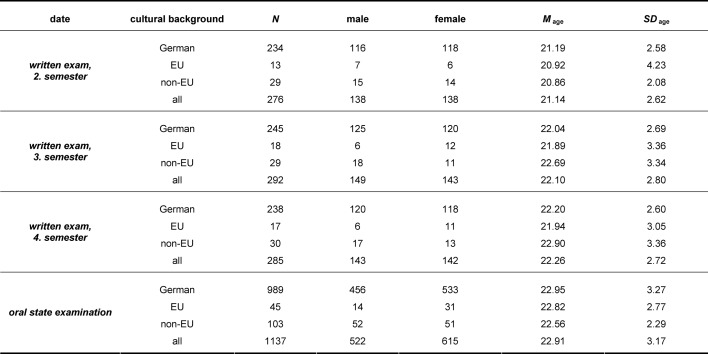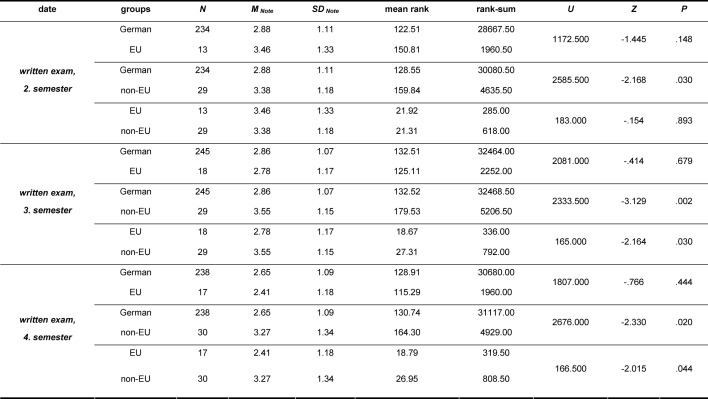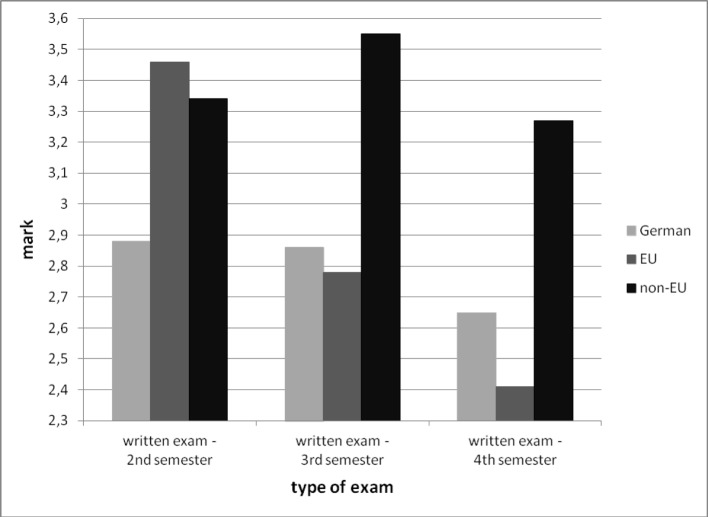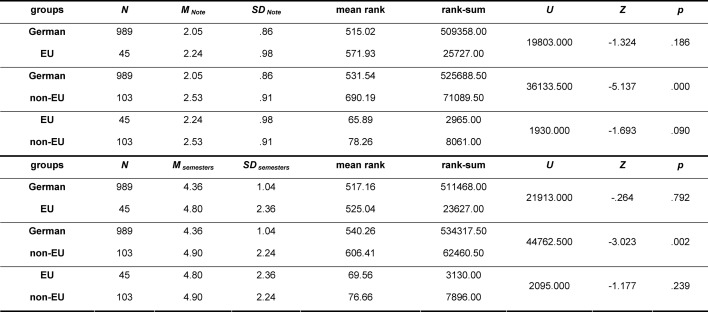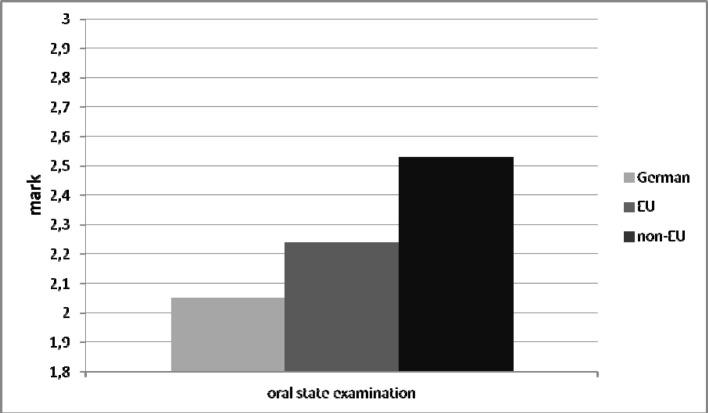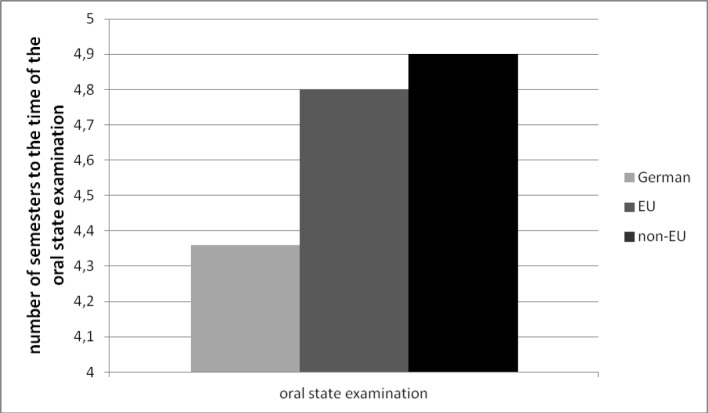Abstract
Introduction: Medical students with a migration background face several specific problems during their studies. International surveys show first indications that this group of students performs worse in written, oral or practical exams. However, so far, nothing is known about the performance of international students in written pre-clinical tests as well as in pre-clinical State Examinations for German-speaking countries.
Method: A descriptive, retrospective analysis of the exam performances of medical students in the pre-clinical part of their studies was conducted at the Faculty of Medicine of Heidelberg in for the year 2012. Performance in written tests of the final exams in the second (N=276), third (N=292) and fourth semester (N=285) were compared between German students, students from EU countries and students from non-EU countries. Same comparison was drawn for the performance in the oral exam of the First State Examination in the period from 2009 - 2012 (N=1137).
Results: German students performed significantly better than students with a non-EU migration background both in all written exams and in the oral State Examination (all p<.05). The performance of students with an EU migration background was significantly better than that of students with a non-EU background in the written exam at the end of the third and fourth semester (p<.05). Furthermore, German students completed the oral exam of the First State Examination significantly earlier than students with a non-EU migration background (<.01).
Discussion: Due to its poorer performance in written and oral examinations and its simultaneously longer duration of study, the group of non-German medical students with a country of origin outside of the European Union has to be seen as a high-risk group among students with a migration background. For this group, there is an urgent need for early support to prepare for written and oral examinations.
Keywords: undergraduate medical education, assessment, migration, international medical students
Zusammenfassung
Einleitung: Medizinstudierende mit Migrationshintergrund sind im Rahmen ihres Studiums mit zahlreichen spezifischen Problemen konfrontiert. Internationale Studien geben erste Hinweise darauf, dass diese Gruppe von Studierenden schlechtere Leistungen sowohl in schriftlichen als auch in mündlichen oder praktischen Prüfungen erbringt. Für den deutschsprachigen Raum existieren bisher in Hinblick auf diesen thematischen Fokus keinerlei Erkenntnisse.
Methode: Für das Jahr 2012 wurde eine deskriptive, retrospektive Analyse der Prüfungsleistungen von Medizinstudierenden des vorklinischen Studienabschnitts an der Medizinischen Fakultät Heidelberg für schriftliche Noten der Semesterabschlussklausuren im zweiten (N=276), dritten (N=292) und vierten Fachsemester (N=285) vorgenommen und für die deutschen Studierenden, die Studierenden aus dem EU-Ausland als auch die Studierenden aus dem nicht-EU-Ausland verglichen. Gleiches geschah mit den mündlichen Noten des ersten Staatsexamens für den Zeitraum 2009 - 2012 (N=1137).
Ergebnisse: Deutsche Studierende erzielten in allen Semesterabschlussklausuren sowie in der mündlichen Staatsexamensprüfung signifikant bessere Ergebnisse als Studierende mit einem nicht-EU-staatlichen Migrationshintergrund (alle p<.05). In den Klausuren des dritten und vierten Fachsemesters waren zudem die erbrachten Leistungen der Studierenden mit einem EU-staatlichen Hintergrund signifikant besser als die ihrer außereuropäischen Kommilitonen (p<.05). Außerdem zeigte sich, dass deutsche Studierende zu einem signifikant früheren Zeitpunkt die mündliche Staatsexamensprüfung absolvierten als Studierende mit einem nicht-EU-staatlichen Hintergrund (p<.01).
Diskussion: Die Gruppe der nicht-deutschen Medizinstudierenden mit einem Herkunftsland außerhalb der Europäischen Union ist mit schlechteren Prüfungsergebnissen bei zeitgleich längerer Studienzeit als hochrelevante Risikogruppe innerhalb der Studierenden nicht-deutscher Herkunft auszumachen.
Introduction
The number of students from non-German origins has been risen continuously in the last years. 20 years ago only 35.000 foreign students had decided to study in Germany. However, 10 years back this number had already doubled with 70.000 non-German elementary students and by 2011 it reached the peak with more than 88.000 foreign students [1]. While some of these non-German students had been living in Germany as well as had been visiting a German school a majority of 79% came to Germany for their studies for the first time [1]. Within the discipline of medicine the percentage of students from non-German origins is relatively constant with ca. 15% in the past five years; i.e. more than 2.000 students with a migration background start studying medicine at a German university every year [1]. These figures show clearly that there is a need for paying attention to the group of students with migration backgrounds with respect to social integration as well as performance requirements; simultaneously research activities in this range of topics are still insufficient – especially in the German-speaking world [2], [3], [4], [5].
International studies from European countries show that medical students with a migration background are already disadvantaged compared to those students without such a background within the application process to their studies [6], [7], [8], [9]. In the course of their studies foreign medical students report more often personal distress, a reduced health-related quality of life [3], [10], insufficient support [3], [6] as well as the lack of social contacts [3], [11] and they show higher neuroticism-scores in inquiries of personality diagnostics [12]. These loading factors are possibly accountable for higher drop-out rates of foreign students compared to their fellow students without migration backgrounds [5], [11]. And in the case they do complete their studies this takes place after a significantly higher number of semesters [13].
With respect to longer duration of studies and higher drop-out rates of foreign students the university test performances seem to matter especially. Both under the aspect of a potentially personal stressor and under the viewpoint of an obstacle that is harder to overcome for students with migration backgrounds [14], [15] it can be assumed that examinations are a major loading factor for foreign students. International studies from Europe and Australia showed that foreign students obtained worse results than their fellow students without a migration background – in written, oral and practically examinations [14], [16], [17], [18], [19], [20], [21], [22]. It could be shown in a German survey that medical students that rated themselves as non-native speakers were assessed equally like native speakers in an OSCE by doctors and fellow students, but much worse by simulation patients [23]. However, to our knowledge no other German surveys exist that compare written or oral test performances of German and foreign students in the preclinical study-term.
Aim of the current study was it to compare the performance of German, EU- and non-EU-medical students both in written exams (tests at the end of the second, third and fourth semester) and in the oral state examination. We assumed that both students with (i) EU- and (ii) without EU-background would perform worse in written as well as oral exams than German students, that (iii) this performance would be worse in non-European students than in European, that (iv) European as well as (v) non-European students would pass the oral state examination later (higher semester) than German students and that students (vi) without EU-background would pass the oral state examination later than students with an EU-background.
Method
Study design
The current study is a retrospective analysis of medical students’ test performances within the preclinical studying-term at the Medical Faculty of Heidelberg. Both marks of tests written at the end of the second, third and fourth semester (“integrated exams”) of the year 2012 and the marks of the oral state examination for the period 2009 to 2012 fed into the analysis. Obtained data were put in connection with information about students’ origin (migration background, differentiated by EU- and non-EU-states) as well as the current semester.
Sample description
Sample of the written exams in the preclinical studying-term
Data of test performances in the written exams at the end of the second, third and fourth semester were provided by the Deanery of Student Affairs at the Medical Faculty Heidelberg for the year 2012. Only data of such students that took part in the tests for the first time were fed into the analysis; participants in repeat tests in case of not passing the first one were not considered.
Sample of the oral exam within the frame of the first state examination
Data of test performances in the oral state examination were provided by the Deanery of Student Affairs at the Medical Faculty Heidelberg for those students that had absolved the state examination in the period 2009 to 2012. Only the data of such students fed into the analysis that took part in the exam for the first time; participants in repeat exams were not considered.
Determination of the cultural background within the samples
There existed two pieces of information concerning the origin of the students that written and oral exam performances were compared with each other: their nation statehood and their place of birth. If one of these two variables was non-German further differentiations in EU- as well as non-EU-countries were carried out. Further, the following countries of origin were put in the category “German”: Austria, the German part of Switzerland, Liechtenstein and Luxembourg because all of these states are at least partly German-speaking. So there are no bigger difficulties in adapting of these students to be assumed. Thus, on basis of the described methodological undertaking the following categories were formed: students with a (i) German-speaking origin, students with an (ii) EU- as well as a (iii) non-EU-migration background.
Conception of the written exams at the end of the semesters
The exams at the end of second, third and fourth semester were multiple-choice-tests. Each test consisted out of 90 questions in question-type A [24]. Students had a maximum of 135 minutes for answering the questions. Between the different involved disciplines distribution of the number of questions was as follows:
second semester: 40 questions anatomy, 30 questions biology, 5 questions microbiology, 15 questions physiology
third semester: 25 questions anatomy, 30 questions biology, 35 questions physiology
fourth semester: 30 questions anatomy, 30 questions biology, 30 questions physiology
In each test a maximum of 90 points could be reached which were transformed in marks (1=“excellent” to 5=“failed”) in line with a given ratio.
Framework conditions of the oral exam within the first state examination
In accordance with the German medical licensure act (Approbationsordnung) (§§ 22, 24 ÄAppO) [25] the oral-practical exams of the first state examination took place with up to four simultaneously tested students and lasted between 45 and 60 minutes each testee. Three examiners – one each of the disciplines anatomy, physiology and biology – asked students questions rotationally. Additional to answering the questions students were asked to perform practical exercises and demonstrations on anatomical preparations as well as the microscope. Examiners agreed upon each student’s mark (1=“excellent” to 5=“failed”; exam counts as passed if testee achieves at least a 4=“adequate”) subsequent to the exam and made their decision with the majority of votes. Only full marks could be given; in case of a voting tie chairman’s vote tipped the balance.
Statistical analysis
Analysis of date was carried out with the “Statistical Package for the Social Sciences“(SPSS) for Windows in the version 20. Kolmogorov-Smirnov-test was applied to check data’s probability distribution. Both for written tests’ data as well as oral state examination’s data the critical value for normal distribution p<.05 was reached which means that you cannot assume a normal distribution of the marks which lead to the use of nonparametric tests. To compare the different groups with one another (German vs. EU, German vs. non-EU and EU vs. non-EU) regarding the achieved performances in the written tests or the oral state examination Mann-Whitney-U-tests were used; for each sample three comparisons were made. Also for the comparison of the absolved semesters at the time of the oral stat examination Mann-Whitney-U-tests were calculated for the differences of the groups with one another (German vs. EU, German vs. non-EU and EU vs. non-EU); also in this case three comparisons in total. The reliabilities of the written exams were given with Cronbach’s Alpha.
Results
Sample description
Sample of the written exams in the preclinical studying-term
For the written exams all data for students’ test performance were available. The subsequent sections outline the samples of the second, third and fourth semester which were included in the calculations (see also Table 1 (Tab. 1)):
Table 1. Descriptive presentation of written exams’ samples of the second, third and fourth semester.
Second semester: the initial sample consisted out of 276 medical students. 234 of them were German-speaking, 13 had an EU- and 29 a non-EU-migration background.
Third semester: 292 medical students took part in the written exam. 245 of them were German-speaking, 18 came from EU- and 29 from non-EU-countries.
Fourth semester: There were 285 medical students taking part in the written exam at the end of the fourth semester; 238 were German-speaking, 17 had an EU- and 30 a non-EU-migration background.
In one case nation statehood as well as place of birth was non-German, however, nation statehood concerning an EU- (Belgian) and place of birth concerning a non-EU-country (born in Moscow). This case was categorised by nation statehood and therefore counted into the EU-category.
Sample of the oral exam within the frame of the first state examination
The initial sample consisted out of 1140 medical students of the University of Heidelberg. Three examinees had to be excluded from the study because for unknown reasons there were no data concerning their achieved marks available. 969 of the remaining 1137 students were German-speaking. 45 had an EU- and 103 had a non-EU migration background (see Table 1 (Tab. 1)).
There was the (same) case within the oral state examination that one student was Belgian (EU) citizen, however, was born in Moscow (non-EU). Also in this case he was counted into the EU-category.
Performance differences between German and international students
In this section results are presented to the hypotheses outlined above.
Examination performances in the written tests at the end of semesters in the preclinical studying-term
To calculate the examination performance in written test at the end of second semester Mann-Whitney-U-tests were used. The comparison between German students and students with a non-EU migration background showed a significant effect (U=2585.500: p<.05); German students were significantly better than their non-European fellow students (see Table 2 (Tab. 2) and Figure 1 (Fig. 1)).
Table 2. Mann-Whitney-U-Test for marks in written exams in German, EU- and non-EU-students.
Figure 1. Bar diagram for differences between German, EU- and non-EU-students concerning the achieved marks in written exams of 2nd, 3rd and 4th semester.
Also the Mann-Whitney-U-test for the results of written tests in the third semester showed a significant effect for the comparison of the achieved marks between German and non-European students (U=2333.500; p<.01); again German students were significantly better. The comparison of the marks of European and non-European students showed a significant result, too (U=165.000; p<.05); students with an EU- migration background showed significantly better results than students with a non-EU-background (see Table 2 (Tab. 2) and Figure 1 (Fig. 1)).
Also for the written test at the end of the fourth semester Mann-Whitney-U-test showed a significant result concerning the comparison of achieved marks between German and non-European students (U=2676.000; p<.05); German students showed significantly better results than their non-European fellow students. The comparison between students with an EU- and students with a non-EU migration background was significant, too (U=166.500; p<.05); European students achieved significantly better marks than non-European students (see Table 2 (Tab. 2) and Figure 1 (Fig. 1)).
Examination performance in the oral exam of the first state examination
The Mann-Whitney-U-test for the shown performance in the oral exam of the first state examination showed a significant result for the comparison of German students and students with a non-EU-migration background (U=36133.500; p<.001); German students achieved significantly better marks than their non-European fellow students (see Table 3 (Tab. 3) and Figure 2 (Fig. 2)). Also at date of examination German students were in a significantly lower semester than non-European students (U=44762.500; p<.01; see Table 3 (Tab. 3) and Figure 3 (Fig. 3)).
Table 3. Mann-Whitney-U-Test for marks in oral state examination or number of semesters to the time of the examination in German, EU- and non-EU-students.
Figure 2. Bar diagram for differences between German, EU- and non-EU-students concerning the achieved marks in the oral state examination.
Figure 3. Bar diagram for differences between German, EU- and non-EU-students concerning the number of semesters to the time of the oral state examination.
Reliabilities of the written tests
In the following reliabilities of the written tests of the year 2012 are given:
second semester: α=.91
third semester: α=.90
fourth semester: α=.92
Discussion
The current study is – according to the authors – the first survey that analyses examination performances of German and non-German medical students in written tests within the preclinical studying-term as well as in the oral exam of the first state examination. In all written tests as well as in the oral exam the group of German students showed significantly better results than the group of students with a non-EU-migration background. Furthermore, in the written tests at the end of third and fourth semester the performance of students with an EU-background was significantly better than the one of their non-European fellow students. Besides it turned out that German-speaking students absolved the oral state examination to a significantly earlier time in studies than students with a non-European background. Limitations lie in the fact that the study is retrospective and explorative. Therefore it may demonstrate relevant differences between German and non-German students regarding their exam performances in terms of a “justification study”[26], however, with respect to potential backgrounds for the detected discrepancies it cannot take a final position in terms of a “clarification study” [26].
The current study demonstrates impressively that non-German medical students coming from countries outside the European Union score significantly worse than their German fellow students both in written tests at the end of second, third and fourth semester and the oral state examination. These non-EU-students also absolve the state examination significantly later than German students. In the third and fourth semester non-European students not only show significantly worse exam performances than their German, but also than their European fellow students which could speak for a better adaptation of students with an EU-background to the new situation in Germany. The group of non-European students – with a worse test performance and a longer duration of study – has to be seen as highly relevant risk group among non-German students.
In view of the fact of several international surveys that came to similar conclusions [14], [17], [18], [22] these results are hardly surprising on the one hand. On the other hand the present paper is the first survey of this kind for the German-speaking area. How important it is to undertake studies in your own personal and cultural spheres becomes clear if you look at surveys from the USA [11], [13], [15], [27]. Even these studies show obvious test performance differences – e.g. high school average marks or medical admission tests – between medical students of different origins. In these surveys there is made a distinction between US-American and international medical students. However, the international students frequently also have graduated from American schools and only belong to an ethnic minority living in the USA. Classical immigration countries like the USA or Australia have a completely different structure of society than e.g. former colonial states like Great Britain or France. And in a country like Germany again we find absolutely different structures. Reasons for the found performance distinctions could be due to linguistic differences to a large extent [22]. The German written tests may solely be multiple-choice-tests in which the right answer has to be detected passively only [23] but it can be expected that replying to many questions in a short time a native speaker is clearly superior to a non-native speaker because he can capture and understand the content of a question quicker and therefore has more time for answering it. Furthermore ambiguities of the designed questions can cause obvious confusion in non-native speakers.
While European students show only minor (non-significant) differences to their German fellow students, non-European students have obvious, significant deficits. European students’ less clearly decrease in exam performance could be due to the fact that a majority of medical terminology has Latin or Greek origins. Students that mother tongue is closer to these geolinguistic origins could show less difficulties when dealing with language based tasks. E.g. students that have learnt Latin at school perform better than students that do not have had the same experience. And students with a European mother tongue perform better than those with a non-European [28]. Another consideration concerning non-European students’ worse exam performance could be that these are confronted with a bigger cultural adaptation than European students. It can be expected that initial psychosocial disorientation with maybe even related health problems increase in people with migration backgrounds the bigger cultural differences are between home country and chosen centre of life [29]. This effect could come into play in our study, too, and lead to non-European students’ worse exam performance. Another possibility to interpret the differing performances lies in a closer inspection of the admission procedures of German Medical Faculties for study places. While non-German EU-citizens are equivalent to German citizens concerning the allocation of study spots, i.e. they have to recommend themselves via excellent school achievements, situation for non-EU-citizens is different: For them admission for studying medicine is quoted on 5% through Stiftung für Hochschulzulassung (SfH; foundation for the allocation of study places) which means that 5% of all places for studying medicine in Germany are given to students from non-EU-countries after assessment and language tests [http://www.hochschulstart.de/fileadmin/downloads/Gesetze/G03.pdf]. Because of these differing studying admissions it cannot be ruled out that European and non-European candidates could differ with regard to their performance levels.
With reference to the oral state examination it can also be assumed that a native speaker has advantage over a student having learnt German as a foreign language. So it is easier for him to express his thoughts fluently which might result in a better mark. This assumption is supported by a study of Wass and colleagues [16] that could show by the example of clinical-practical exams (OSCE; objective structured clinical examination [30]) that students from ethnic minorities performed significantly worse than students without migration background. If it can be observed that examiners not only assess examinees’ competence but also their performance this is labelled as examiner-bias [20]. While such a tendency seems to be understandable on the one hand because it is hard to distinguish between linguistic performance and objective level, some authors go as far to name this discrimination [31]. The later time at which non-German students absolve their first state examination perhaps can be explained by the earlier worse exam performances. These lead to increased repetitions of exams and tests which can cause the application’s postponement of the state examination. Furthermore, in many cases the financial situation of foreign students is precarious so that they have to work parallel to their studies to earn their living. However, this causes less time for studying which results in a longer duration of study [32].
Taking into account non-European students’ significantly worse exam performance in written tests the question arises whether to extend handling time for answering the multiple-choice-questions for this specific group which is already discussed at some locations. At the same time this idea causes serious difficulties in respect of an equal treatment approach for all students, particularly concerning the question who should profit from such reliefs and who not. In any case it would be interesting to discover whether non-native speakers really could benefit from such an action. Regarding the oral state examination foreign students might benefit from specific exam training courses like they are offered in the practical year [33]. A current survey of all Medical Faculties in Germany showed that just about half of the locations offer specific tutorials for foreign students – like at the Medical Faculty of Heidelberg in the winter semester 2013/2014 the Heidelberg’s Tutorial for international Medical students (HeiTiMed) should be achieved. In these tutorials learning contents are repeated or exams are prepared. Both foreign students and stuff at deaneries of student affairs experience them as helpful and beneficial (unpublished data).
Limitations of the current study lie in the fact that it is a retrospective, explorative analysis which can only support speculations about causal links and backgrounds of the results in terms of a “clarification study” [26]. However, the study shows the need for further studies that investigate reasons behind the clear performance differences. Another limiting aspect is that students’ migration background could be detected only out of the parameters “nationality” and “place of birth”. This approach can cause incorrect assessments concerning the actual migration background. Therefore it would be desirable to provide further prospective studies investigating exam performance of German and non-German students that are able to give a more detailed differentiation concerning the various countries of origin. While written tests’ reliabilities showed excellent values another critical note is that there are no quality criteria for the oral state examination. However, a low reliability is to be expected because it is known from the bibliography that oral examinations that are often held without a definition of aims and expectations show much worse reliability scores than written exams [34]. An analysis of written state examinations could not be implemented due to the regulations of the state examination board. Another limitation to be named is the fact that due to multiple testing within the same sample (German vs. EU, German vs. non-EU and EU vs. non-EU) the likelihood to gain a significant result even under coincidence is increased. A Bonferroni correction of the significance level was not realised.
In summary, it can be said that foreign students with a non-EU migration background show worse results than their German fellow students and absolve the first state examination later. Further research efforts should address the backgrounds of these differences.
Competing interests
The authors declare that they have no competing interests.
References
- 1.Statistisches Bundesamt. Bildung und Kultur - Studierende an Hochschulen. Wiesbaden: Statistisches Bundesamt; 2012. (Fachserie 11/Reihe 4.1). Available from: https://www.destatis.de/DE/Publikationen/Thematisch/BildungForschungKultur/Hochschulen/StudierendeHochschulenVorb2110410138004.pdf?__blob=publicationFile. [Google Scholar]
- 2.Schaafsma ES, Raynor TD, de Jong-van den Berg LT. Accessing medication information by ethnic minorities: barriers and possible solutions. Pharm World Sci. 2003;25(5):185–190. doi: 10.1023/A:1025812716177. Available from: http://dx.doi.org/10.1023/A:1025812716177. [DOI] [PubMed] [Google Scholar]
- 3.Kurré J, Scholl J, Bullinger M, Petersen-Ewert C. Integration and health-related quality of life of undergraduate medical students with migration backgrounds - Results of a survey. GMS Psychosoc Med. 2011;8:Doc07. doi: 10.3205/psm000076. Available from: http://dx.doi.org/10.3205/psm000076. [DOI] [PMC free article] [PubMed] [Google Scholar]
- 4.Chenot JF, Simmenroth-Nayda A, Scherer M. Medizinstudierende ausländischer Herkunft - Eine Forschungslücke. GMS Z Med Ausbild. 2007;24(1):Doc70. Available from: http://www.egms.de/static/de/journals/zma/2007-24/zma000364.shtml [zuletzt zugegriffen am 19.11.2013] [Google Scholar]
- 5.Ferguson E, James D, Madeley L. Learning in practice. Factors associated with success in medical school: systematic review of the literature. BMJ. 2002;324(7343):952–857. doi: 10.1136/bmj.324.7343.952. Available from: http://dx.doi.org/10.1136/bmj.324.7343.952. [DOI] [PMC free article] [PubMed] [Google Scholar]
- 6.McManus IC, Richards P, Winder BC, Sproston KA, Styles V. Medical school applicants from ethnic minority groups: identifying if and when they are disadvantaged. BMJ. 1995;310(6978):496–500. doi: 10.1136/bmj.310.6978.496. Available from: http://dx.doi.org/10.1136/bmj.310.6978.496. [DOI] [PMC free article] [PubMed] [Google Scholar]
- 7.McManus IC. Factors affecting likelihood of applicants being offered a place in medical schools in the United Kingdom in 1996 and 1997: retrospective study. BMJ. 1998;317(7166):1111–1116. doi: 10.1136/bmj.317.7166.1111. Available from: http://dx.doi.org/10.1136/bmj.317.7166.1111. [DOI] [PMC free article] [PubMed] [Google Scholar]
- 8.Lumb AB, Vail A. Difficulties with anonymous shortlisting of medical school applications and its effects on candidates with non-European names: prospective cohort study. BMJ. 2000;320(7227):82–85. doi: 10.1136/bmj.320.7227.82. Available from: http://dx.doi.org/10.1136/bmj.320.7227.82. [DOI] [PMC free article] [PubMed] [Google Scholar]
- 9.McKenzie KJ. Racial discrimination in medicine. BMJ. 1995;310(6978):478–479. doi: 10.1136/bmj.310.6978.478. Available from: http://dx.doi.org/10.1136/bmj.310.6978.478. [DOI] [PMC free article] [PubMed] [Google Scholar]
- 10.Leung C. The psychological adaptation of overseas and migrant students in Australia. Int J Psychol. 2001;36(4):143–154. doi: 10.1080/00207590143000018. Available from: http://dx.doi.org/10.1080/00207590143000018. [DOI] [Google Scholar]
- 11.Shields PH. A survey and analysis of student academic support programs in medical schools focus: underrepresented minority students. J Natl Med Assoc. 1994;86(5):373–377. [PMC free article] [PubMed] [Google Scholar]
- 12.McManus IC, Livingston G, Katona C. The attractions of medicine: the generic motivations of medical school applicants in relation to demography, personality and achievement. BMC Med Educ. 2006;6:11. doi: 10.1186/1472-6920-6-11. Available from: http://dx.doi.org/10.1186/1472-6920-6-11. [DOI] [PMC free article] [PubMed] [Google Scholar]
- 13.Castillo-Page L, Zhang K, Steinecke A, Beaudreau J, Moses A, Terrell C. Minorities in Medical Education. Washington, D.C.: Association of American Medical Colleges; 2005. [Google Scholar]
- 14.McManus IC, Richards P, Winder BC, Sproston KA. Final examination performance of medical students from ethnic minorities. Med Educ. 1996;30(3):195–200. doi: 10.1111/j.1365-2923.1996.tb00742.x. Available from: http://dx.doi.org/10.1111/j.1365-2923.1996.tb00742.x. [DOI] [PubMed] [Google Scholar]
- 15.Fiscella K, Frankel R. Overcoming cultural barriers: international medical graduates in the United States. J Am Med Assoc. 2000;283(13):1751. doi: 10.1001/jama.283.13.1751-JMS0405-6-1. Available from: http://dx.doi.org/10.1001/jama.283.13.1751-JMS0405-6-1. [DOI] [PubMed] [Google Scholar]
- 16.Wass V, Roberts C, Hoogenboom R, Jones R, Van der Vleuten C. Effect of ethnicity on performance in a final objective structured clinical examination: qualitative and quantitative study. BMJ. 2003;326(7393):800–803. doi: 10.1136/bmj.326.7393.800. Available from: http://dx.doi.org/10.1136/bmj.326.7393.800. [DOI] [PMC free article] [PubMed] [Google Scholar]
- 17.Wakeford R, Farooqi A, Rashid A, Southgate L. Does the MRCGP examination discriminate against Asian doctors? BMJ. 1992;305(6845):92–94. doi: 10.1136/bmj.305.6845.92. Available from: http://dx.doi.org/10.1136/bmj.305.6845.92. [DOI] [PMC free article] [PubMed] [Google Scholar]
- 18.Haq I, Higham J, Morris R, Dacre J. Effect of ethnicity and gender on performance in undergraduate medical examinations. Med Educ. 2005;39(11):1126–1128. doi: 10.1111/j.1365-2929.2005.02319.x. Available from: http://dx.doi.org/10.1111/j.1365-2929.2005.02319.x. [DOI] [PubMed] [Google Scholar]
- 19.Woolf K, Haq I, McManus IC, Higham J, Dacre J. Exploring the underperformance of male and minority ethnic medical students in first year clinical examinations. Adv Health Sci Educ Theory Pract. 2008;13(5):607–616. doi: 10.1007/s10459-007-9067-1. Available from: http://dx.doi.org/10.1007/s10459-007-9067-1. [DOI] [PubMed] [Google Scholar]
- 20.Liddell MJ, Koritsas S. Effect of medical students' ethnicity on their attitudes towards consultation skills and final year examination performance. Med Educ. 2004;38(2):187–198. doi: 10.1111/j.1365-2923.2004.01753.x. Available from: http://dx.doi.org/10.1111/j.1365-2923.2004.01753.x. [DOI] [PubMed] [Google Scholar]
- 21.Hawthorne L, Minas IH, Singh B. A case study in the globalization of medical education: assisting overseas-born students at the University of Melbourne. Med Teach. 2004;26(2):150–159. doi: 10.1080/0142159032000150539. Available from: http://dx.doi.org/10.1080/0142159032000150539. [DOI] [PubMed] [Google Scholar]
- 22.Mann C, Canny B, Lindley J, Rajan R. The influence of language family on academic performance in Year 1 and 2 MBBS students. Med Educ. 2004;44(8):786–794. doi: 10.1111/j.1365-2923.2010.03711.x. Available from: http://dx.doi.org/10.1111/j.1365-2923.2010.03711.x. [DOI] [PubMed] [Google Scholar]
- 23.Koch A, Fischer T, Simmenroth-Nayda A, Scherer M, Emmert B, Kochen MM, Chenot JF. Sind Nicht-Muttersprachler bei der OSCE benachteiligt? GMS Z Med Ausbild. 2005;22(4):Doc150. Available from: http://www.egms.de/static/en/journals/zma/2005-22/zma000150.shtml. [Google Scholar]
- 24.Krebs R. Multiple Choice Fragen? - Ja, aber richtig. Bern: Universität Bern - Medizinische Fakultät. Institut für Medizinische Lehre IML. Abteilung für Assessment und Evaluation AAE.; 2008. Available from: http://blog.ilub.unibe.ch/wp-content/uploads/2008/04/mc_kolloquium_krebs_22_04_08.pdf. [Google Scholar]
- 25.Bundesministerium für Gesundheit. Approbationsordnung für Ärzte vom 27. Juni 2002 (BGBl. I S. 2405), die zuletzt durch Artikel 3 des Gesetzes vom 22. Mai 2013 (BGBl. I S. 1348) geändert worden ist. Berlin: Bundesministerium für Gesundheit; 2013. [Google Scholar]
- 26.Cook DA, Bordage G, Schmidt HG. Description, justification and clarification: a framework for classifying the purposes of research in medical education. Med Educ. 2008;42(2):128–133. doi: 10.1111/j.1365-2923.2007.02974.x. Available from: http://dx.doi.org/10.1111/j.1365-2923.2007.02974.x. [DOI] [PubMed] [Google Scholar]
- 27.Castillo-Page L. Diversity in Medical Education: Facts & Figures 2012. Washington, D.C.: Association of American Medical Colleges; 2012. [Google Scholar]
- 28.Long AJ, Ingram MJ, Pugh WJ, Bowes P, Haigh SJ, Moss GP. The effect of language background on teaching and learning in the master of pharmacy degree. Am J Pharm Educ. 2008;8(1):45–52. [Google Scholar]
- 29.Cole JB, Allen FCL, Green JS. Survey of Health Problems of Overseas Students. Soc Sci Med. 1980;14(6):627–631. doi: 10.1016/0160-7979(80)90067-3. [DOI] [PubMed] [Google Scholar]
- 30.Wass V, Van der Vleuten C, Shatzer J, Jones R. Assessment of clinical competence. Lancet. 2001;357(9260):345–349. doi: 10.1016/S0140-6736(00)04221-5. Available from: http://dx.doi.org/10.1016/S0140-6736(00)04221-5. [DOI] [PubMed] [Google Scholar]
- 31.Dillner L. Manchester tackles failure rate of Asian students. BMJ. 1995;310(6974):209. doi: 10.1136/bmj.310.6974.209. Available from: http://dx.doi.org/10.1136/bmj.310.6974.209. [DOI] [PMC free article] [PubMed] [Google Scholar]
- 32.Isserstedt W, Middendorff E, Fabian G, Wolter A. Die wirtschaftliche und soziale Lage der Studierenden in der Bundesrepublik Deutschland 2006. Berlin: Bundesministerium für Bildung und Forschung (BMBF); 2007. [Google Scholar]
- 33.Krautter M, Jünger J, Koehl-Hackert N, Nagelmann L, Nikendei C. Evaluation of a structured, longitudinal training program for the preparation for the second state exam (M2) - a quantitative analysis. Z Evid Fortbild Qual Gesundh wesen. 2012;106(2):110–115. doi: 10.1016/j.zefq.2011.09.020. Available from: http://dx.doi.org/10.1016/j.zefq.2011.09.020. [DOI] [PubMed] [Google Scholar]
- 34.Jäger RS. Von der Beobachtung zur Notengebung – Ein Lehrbuch: Diagnostik und Benotung in der Aus-, Fort- und Weiterbildung. Landau: Empirische Pädagogik; 2000. [Google Scholar]



